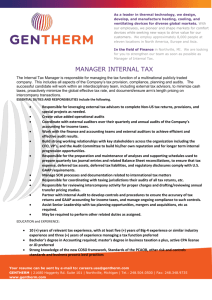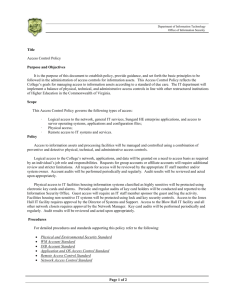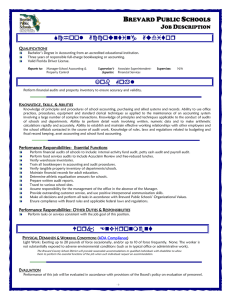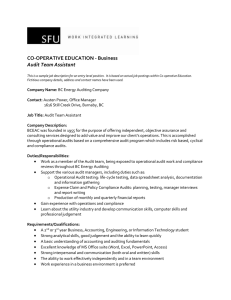Members of the Sandwell Mental ... Board are pleased to present ... Quality Account - 09/10
advertisement
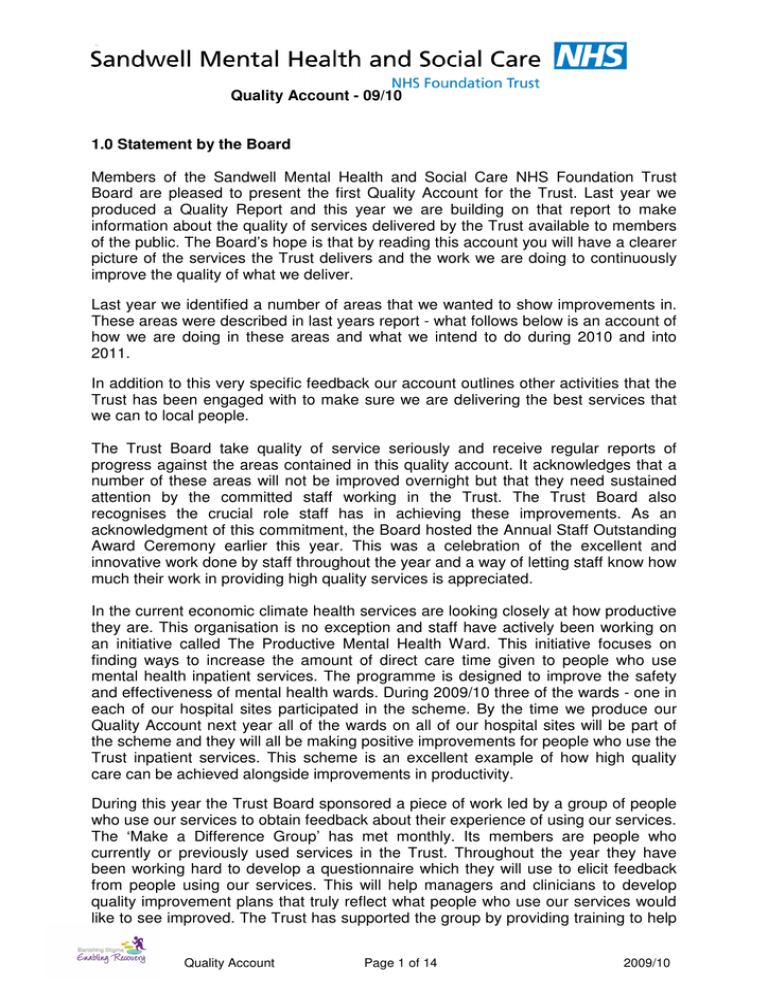
Quality Account - 09/10 1.0 Statement by the Board Members of the Sandwell Mental Health and Social Care NHS Foundation Trust Board are pleased to present the first Quality Account for the Trust. Last year we produced a Quality Report and this year we are building on that report to make information about the quality of services delivered by the Trust available to members of the public. The Board’s hope is that by reading this account you will have a clearer picture of the services the Trust delivers and the work we are doing to continuously improve the quality of what we deliver. Last year we identified a number of areas that we wanted to show improvements in. These areas were described in last years report - what follows below is an account of how we are doing in these areas and what we intend to do during 2010 and into 2011. In addition to this very specific feedback our account outlines other activities that the Trust has been engaged with to make sure we are delivering the best services that we can to local people. The Trust Board take quality of service seriously and receive regular reports of progress against the areas contained in this quality account. It acknowledges that a number of these areas will not be improved overnight but that they need sustained attention by the committed staff working in the Trust. The Trust Board also recognises the crucial role staff has in achieving these improvements. As an acknowledgment of this commitment, the Board hosted the Annual Staff Outstanding Award Ceremony earlier this year. This was a celebration of the excellent and innovative work done by staff throughout the year and a way of letting staff know how much their work in providing high quality services is appreciated. In the current economic climate health services are looking closely at how productive they are. This organisation is no exception and staff have actively been working on an initiative called The Productive Mental Health Ward. This initiative focuses on finding ways to increase the amount of direct care time given to people who use mental health inpatient services. The programme is designed to improve the safety and effectiveness of mental health wards. During 2009/10 three of the wards - one in each of our hospital sites participated in the scheme. By the time we produce our Quality Account next year all of the wards on all of our hospital sites will be part of the scheme and they will all be making positive improvements for people who use the Trust inpatient services. This scheme is an excellent example of how high quality care can be achieved alongside improvements in productivity. During this year the Trust Board sponsored a piece of work led by a group of people who use our services to obtain feedback about their experience of using our services. The ‘Make a Difference Group’ has met monthly. Its members are people who currently or previously used services in the Trust. Throughout the year they have been working hard to develop a questionnaire which they will use to elicit feedback from people using our services. This will help managers and clinicians to develop quality improvement plans that truly reflect what people who use our services would like to see improved. The Trust has supported the group by providing training to help Quality Account Page 1 of 14 2009/10 them feel confident in undertaking feedback surveys with people who use our services. Also during this year the Trust Board adopted a 3 year Quality Strategy. This strategy outlines the key priorities for action for the organisation. Amongst these priorities is the establishment of the Quality Council. The council is chaired by a Non Executive Director. Membership of the council is made up of Trust Members and Governors. The Council meets twice a year and receives feedback on progress made against Quality Improvement Plans, CQUIN and quality account priorities. In addition, the Quality Council will be consulted about their priorities for quality improvement. As such the Council functions as an advisory group made up of trust members and governors. The inaugural meeting of the Quality Council was held in early March and attended by 30 members and governors of the Trust. The Council received presentations from 4 of the service areas describing the quality improvements that have been made. Colleagues from the local commissioning Primary Care Trust, LINKs, the Make a Difference Group and the Chairperson of the Overview and Scrutiny Committee were also invited. The Board sees the Quality Council as a major forum for engaging with members and governors about quality. It provides an opportunity for key stakeholders to offer a challenge to the organisation in respect of its own internally generated view of quality. Members attending this council were asked to help to develop a local definition for the three areas for quality identified by Lord Darzi. The outcome of this exercise will help to inform the detail of the Quality Improvement Plans for 2010 / 2011 Sandwell Primary Care Trust has commenced monthly Service Quality Review Meetings with senior officers of the Trust. These meetings provide an opportunity for our commissioners to regularly monitor the quality of the services offered. The Trust Board is keen that services are subject to external scrutiny. To this end it has once again commissioned an independent organisation to conduct quality of life audits in a number of inpatient areas. This work is described in more detail below In publishing this account the Trust Board have reviewed its content and verified the accuracy of the details contained therein. Signed K. E. Dowman Chief Executive Officer on behalf of the Trust Board Quality Account Page 2 of 14 2009/10 2.0 Priorities for Improvement For several years the service areas have been generating a local Quality Improvement Plan. These have been based on what the service areas recognise to be their local priorities for service improvements. The plans have been structured around making sure services are patient focused, safe, effective, well governed, accessible and responsive and delivered in clean and appropriate environments. The plans are wide ranging and detailed. These service delivery areas Quality Improvement Plans which are approved by the Trust Executive Committee are reviewed on a quarterly basis by the Clinical Effectiveness Committee. The chair of this group gives a monthly report to the Quality Assurance Committee - a subgroup of the Trust Board. Outlined below are the trust wide priorities for quality improvement. In addition to these there are a number of service specific initiatives. These are not detailed in this report. The Trust Board recognises the very significant health inequalities that exist for people who have severe mental illness. This will continue to be an area for quality improvement across the Trust. During 09/10 work focused primarily on inpatient areas. This will be extended to ensure people attending outpatient appointments have access to information and support to stop smoking. This is a local health economy priority where approximately 30% of the general population continue to smoke. It is likely that this figure will be higher for people using our services. As a Board we do not currently know the extent of the issue but the proposed work will assist with this. People using inpatient service will continue to have physical health assessments on admission and at periods throughout their stay. In addition, inpatients will continue to be screened for their risks of developing Cardiovascular Disease. Both of these screening processes include advice and support in respect of smoking cessation. An audit process will be put in place to gather data about how many people attending outpatients can be shown to have had advice about smoking cessation. Progress against an improvement target will be reported quarterly to the Trust Board. National surveys of people who use mental health services consistently show they have a perception that they do not receive adequate information about the side effects of prescribed medication. This was reinforced during a recent consultation at the Quality Council. Inadequate information is often cited by people who use services as a factor which may contribute to poor adherence with medication regimes, including prematurely stopping taking the prescribed medication. This impacts on outcomes for people. In our recent self assessment in preparation for the organisation’s application for registration with the Care Quality Commission, paucity of information in relation to medicines was acknowledged as a shortfall by the Board. The Trust Board is therefore supporting a scheme that seeks to increase the amount of information that people using services get in respect of the side effects of their medication. The provision of information will be measured by audits conducted twice during the year. Quality Account Page 3 of 14 2009/10 This data will give the Board a baseline against which improvement can be measured. Progress against the improvement target will be reported to the Trust Board after the second audit has been completed Auditing the quality of the experience of people who use our inpatient services has given the Trust Board a wealth of information which will help to inform priorities in a number of areas. The Board has agreed that this work - which cuts across a number of the priority areas identified in the previous quality report, should continue to be an activity that supports quality improvement. During 09/10 a number of audit tools were developed. The data from the completed audits has only become available at the end of the year which this account covers. It is clear, however, that a wealth of information is available via these audits. The information touches on how safe people who use services feel as well if they are treated with dignity and respect - two areas of work for 09/10 and which require continuous improvement during 10/11. Re-audits of the areas audited in 09/10 will be undertaken in the first half of 10/11 – the outcome of these audits and proposal for further improvements will be reported to the Trust Board 3.0 Statement of Assurance by the Board Review of Services. During 2009/2010 Sandwell Mental Health and Social Care NHS Foundation Trust provided both inpatient and community NHS services for people with mental health problems and people with learning disabilities. The Board regularly reviews the available data on the quality of care for a number of quality indicators which take account of patient safety, patient experience and clinical effectiveness. Some of these indicators are those covered by the CQUIN schemes and therefore represent 0.5% of the Trust income / activity. In addition the Trust has introduced a twice yearly thematic review of services. All services provided within the organisation are subject to these reviews which consider a range of measures including performance against the service derived quality improvement plan. These reviews are led by members of the executive team and attended by senior officers from the operational management team for each of the service areas. Via this mechanism all services within the organisation have been reviewed during the year 09/10. The income generated by the NHS services reviewed in 2009/2010 represents100% of the total income generated from the provision of NHS services by Sandwell Mental Health and Social Care NHS Foundation Trust. Participation in Clinical Audit During 2009 / 2010 the trust was eligible to participate in six national clinical audits and related clinical quality data collection programmes, and one national confidential enquiry, covering services it provides. The national clinical audits and confidential enquiries that Sandwell Mental Health NHS and Social Care Foundation Trust participated in are as follows: National Audit of Psychological Therapies for Anxiety and Depression Awaiting confirmation of start date and criteria. National Falls and Bone Health in Older People Data collection starts in May 2010. Quality Account Page 4 of 14 2009/10 Data collection completed. Report due end of 2010. Thirty two cases were submitted. This represents 100% of registered cases required by the Royal College. National Audit of Continence Care POMH (National Prescribing Observatory for Mental Health) Topic 1e supplementary follow up of high dose and combination antipsychotic prescribing 2010 Healthcare Commission Re-audit of Community Mental Health Teams (CMHTs) Data collection completed. Sixty five cases were submitted. This represents 96% of registered cases required by the Royal College. Reports due to be presented to Drugs & Therapeutics Committee in May 2010 110 registered cases were submitted to the Healthcare Commission. This represents 100% of registered cases as required by the Health care Commission. Completed action plan monitored by directorate care governance committee. National Confidential Inquiry of All Suicides in England (2007) and by Mental Health Trusts (2008) Report received via SHA. Action plan focus on adoption of NPSA suicide prevention audit tool. The trust submitted all cases of suicide for the period as required by the NCI. This represents 100% of relevant cases. National Audit of Treatment Resistant Schizophrenia Awaiting notification of start date. National Audit of Dementia Aimed at general acute hospitals only so ineligible to participate During 2009/2010 the Trust participated in 100% of the national clinical audits and 100% of the national confidential enquiries which it was eligible to participate in • The trust participated in five of the clinical audits for which it was eligible. Only two of these published reports in 2009. the remainder are due during 2010. • Of the national clinical audits in which the trust participated, the care of 100% of eligible patients was measured during the reporting period. • 98% of patients were not covered by available audits during this period. • The proportion of incomplete data within the year reported on in the clinical audits undertaken was 0%. The following actions relating to the national clinical audits including the national confidential enquiry have been approved to improve the quality of healthcare provided: Safety Clinical Effectiveness Patient Experience Implementation of NPSA Review of trust policies Re-audit of service users’ suicide prevention toolkit; relevant to NPSA toolkit satisfaction with services; as part audit programme. Review of outcomes measures. Quality Account Page 5 of 14 2009/10 The trust undertakes a programme of local clinical audit on clinical performance which is reported to the trust board. The reports of 23 local clinical audits were reviewed by the trust in 2009/10. • the care of 100% of selected patient groups was measured during the reporting period for each local clinical audit. Each local clinical audit has a designated patient group with a specific representative sample size audited. The following actions relating to the local clinical audits have been approved to improve the quality of healthcare provided: Safety Review of documentation and training relating to administration and prescribing of medicines; Consolidation of Safeguarding level 2 training for non clinical staff . Clinical Effectiveness Review of trust policies assessed as part audit programme; Alerting staff to policies where audit has identified issues about compliance; Review of recording keeping vis a vis reasons why clients decline Hepatitis A and B vaccinations in substance misuse services. Patient Experience Re-audit of service users’ satisfaction with services; Review of outcomes measures; Private visiting area for young people and their parents/carers identified. Participation in clinical research The number of patients recruited in the previous year to clinical research was 3. The majority of research studies during this period only required staff participation and the number of staff recruited was 49. Use of Commissioning for Quality and Innovation payment framework A proportion of Sandwell Mental Health and Social Care NHS Foundation Trusts contract income in 2009/ 2010 was conditional on achieving quality improvements and innovation goals agreed with the Trust and its commissioners through the Commissioning for Quality and Innovation payment framework. Further details of the 2009/2010 agreed goals and the new goals agreed for 2010/ 2011 are available on request from sue.marshall@smhft.nhs.uk. The monetary total for the income conditional upon achieving quality improvements and innovations in 09/10 was £ 556,432. The monetary total received in 2009/10 was £556,432. Quality Account Page 6 of 14 2009/10 4.0 Information relating to registration with the Care Quality Commission. Statement from the Care Quality Commission The Trust is required to be registered with the Care Quality Commission (CQC). The Trust registration status is that there are no conditions on the Trusts registration. The CQC has not taken enforcement action against the Trust since the start of the reporting year. The Trust has completed its application for registration in respect of Healthcare Associated Infections. No conditions were attached to that registration by the CQC. The Trust is not subject to periodic review by the Care Quality Commission. There have not been any recent periodic or special reviews by the CQC. 5.0 Data Quality In records submitted to the Secondary Uses System (SUS) for inclusion in Hospital Episodes Statistics (HES), the percentage of records including the valid patient’s NHS Number was 99.7% for outpatient appointments and 97.5% for inpatient admissions (Data published up to month 11 in 09/10 ). The Trust was not subject to the Payment by Results clinical coding audit by the Audit Commission during the reporting period. In records submitted to the Secondary Uses System (SUS) for inclusion in Hospital Episodes Statistics (HES), the percentage of records including the valid patient’s General Practitioner Registration Code was 100.0% for outpatient appointments and inpatient admissions (Data up to MONTH 11 2009/10). The Trust’s score for Information Quality and Records Management assessed using the Information Governance Toolkit was 84% in 2008/09 - Audit being undertaken on 22 March. 6. National targets The Trust’s performance against the Monitor Compliance Framework was as follows Indicator Delayed transfers of care 7-day follow-up Quality Account Target Over the full year, less than 7.5% of beds should be occupied by patients whose transfer is delayed Each quarter, 95% of inpatients who are discharged should be followed up within 7 days Page 7 of 14 Performance 6.5% (as at Jan 2010) Q1 – 98.2% Q2 – 92.7% Q3 – 98.0% Q4 – 100.0% (Jan 2010) 2009/10 Crisis gate keeping Each quarter, 90% of admissions to inpatient wards should be seen by the Crisis Resolution team prior to admission Q1 – 94.9% Q2 – 94.3% Q3 – 99.0% Q4 – 97.8% (Jan 2010) The Trust has declared to the Healthcare Commission that it was compliant with all 24 core standards. 7.0 Review of Quality Performance for 2009 - 2010 7.1 Indicators of quality Through a process of consultation with senior clinical staff a number of quality indicators were selected as priorities for improvement in 2009 / 2010. In making the selection it was acknowledged that for some of the indicators to deliver sustained improvement work would need to be ongoing beyond 2010. The indicators are summarised in the table below. Indicator Owners Data Source/ Collection Domain Indicator Rationale for Inclusion • Reduction of health inequalities • Identification of those at risk of physical health difficulties. Clinical Directors Safety Physical Health Checks for patients with a length of stay > 6 months Quarterly Internal Collection Reduction of violence and aggression experienced by staff and service users • Staff survey reports high levels of violence and aggression experienced by staff. • Ensure a safe environment for patients. Head of Nursing and Risk Quarterly Internal Collection Review of the number and nature of safeguarding referrals made Develop understanding of the nature and extent of safeguarding issues in the organisation prior to targeted intervention. Deputy Director for Service Delivery Quarterly Internal Collection Achieve at least Good PEAT scores for environment, food and privacy and dignity Ensuring a high quality environment for patients Facilities Manager Annual PEAT Inspection Formalising regular service user feedback with regards to dignity and respect Support work to meet the expressed needs of service users to be treated with dignity and respect Associate Director Care Governance Quarterly Internal Collection Service User Experie-nce Quality Account Page 8 of 14 2009/10 Clinical Effectiv-eness Undertake quality of life audits with people with learning disabilities and older people Support work to meet the needs of service users to be treated with dignity and respect Associate Director Care Governance Quarterly Internal Collection 95% of all new referrals have a HONOS and score by Q4. Support the development of the use of the Yorkshire Care Pathway Deputy Director for Service Delivery Quarterly Internal Collection Ensure delayed discharges are less than 7.5% across inpatient services Outstanding issue of achievement against MONITOR compliance framework Executive Director for Service Delivery Quarterly Internal Collection Maintain readmission rate below 5% at 28 days post discharge Proxy measure of functionality of community services Executive Director for Service Delivery Quarterly Internal Collection Below is a more detailed outline of the rationale and the descriptors for these quality indicators. For a number of the indicators the data is qualitative rather than quantitative and there are also some indicators that are developmental in nature and so no definitive outcome can be presented in this report. The indicators are broken down into three key areas of safety, outcomes, experience. A summary of the results for the indicators is shown in Table 2. Safe services The reduction of violence and aggression is a challenging agenda. The annual patient and staff surveys have indicated that people who use services and our staff do not always feel safe. A piece of work has started during this year which has initially focused on gathering information to inform understanding of the issues. A quality account ‘Think Tank’ time limited group was set up to consider the quality indicator for the reduction of violence and aggression. Membership includes practitioners with specialist knowledge and skills in this area and representatives from the inpatient settings. We know from previous data that these are the target areas for this work. Key issues discussed by the group have been: - De-escalation skills to be reintegrated within MAPPA training. This has been agreed and will be implemented in 2010 Review of any national work on reducing violence and aggression within mental health services. Findings from the National work on violence and aggression in mental health & learning disability highlighted primarily environmental factors as a major causation. These findings have informed the work of the Think Tank. The focus for this coming year will be on identifying what environmental factors can be manipulated to achieve a greater sense of safety for people who use services and staff providing them Quality Account Page 9 of 14 2009/10 Safeguarding people with mental health difficulties and learning disabilities who may be vulnerable is a fundamental responsibility of the organisation. In 2009/10 work began to develop our understanding of the significant safeguarding issues for the Trust so that specific action can be targeted at developing robust safeguarding referral systems. The outcome of this has been a very significant increase in the number of referrals made to both Children’s Services and the Vulnerable Adults Protection Team. 2008 13 8 Referrals to Children’s Services Referrals of Vulnerable Adults 2009 60 67 People with severe mental health difficulties will on average die 10 years earlier than their age peers. The Trust has implemented a screening programme to identify people at risk from cardio-vascular disease. During 09/10 this programme continued and be supplemented by robust physical health checks for all people who are inpatients for more than 6 months. The monitoring of the data in relation to this shows a high degree of compliance with this indicator (see table 1 below) A Positive Experience Being treated with dignity and respect is consistently identified as a contributory factor in supporting people to have a positive experience of services. During 09/10 work has been undertaken to develop a way of gathering meaningful and objective information about how people who use our services are treated with dignity and respect. This work will link with a programme of ongoing quality of life audits which are conducted by an organisation who are independent of the trust. For a significant part of the year 08/09 work was undertaken to develop quality of life audit tools. The audits were then undertaken by people who have used services. The key themes for quality improvement from the Quality of Life Audits carried out are as follows: Learning Disability Service: Variability in the availability of permanent staff resulting in staff working with patients when they do not know them well. Variable levels of activity or engagement Need for Communication Passports to be further developed for patients on the unit. Need for an accessible complaints process. Older Adults Service: The general ward environment needs updating Shared rooms needs to be reviewed - 4 people sharing a room does not promote privacy and dignity A quiet area needs to be developed where patients can relax on their own or with visitors. Feedback from these audits will be used to identify areas for local quality improvements for the forthcoming year. Quality Account 2009/10 Page 10 of 14 PEAT was established in 2000 to assess NHS hospitals quality relating to the patient environment & food and has been managed by the NPSA since 2006. Under the programme every in-patient NHS facility in England with more than ten beds must be assessed annually and given a rating against a set of core standards of excellent, good, acceptable, poor and unacceptable. PEAT is a self assessment against the set standards to demonstrate how well individual healthcare organisations believe they are performing in key areas including: • • • • • cleanliness food infection control patient environment (including bathroom areas, lighting, floors and patient areas) privacy and dignity ( new category 2009) Since 2007, the Trust has made improvements in its rating for environment and hospital food. Table 1 below compares results from 2006 to 2009 inclusive: Table 1 YEAR 2009 2008 2007 2006 Hospital Edward Street Hallam Street Heath Lane Edward Street Hallam Street Heath Lane Edward Street Hallam Street Heath Lane Edward Street Hallam Street Quality Account 2009/10 Environment Food Privacy & Dignity (new category for 2009) Excellent Excellent Good Good Good Good Good Excellent Good Good Excellent Good Good Good Excellent Good Good Good Good Acceptable Good Poor Acceptable Acceptable Good Page 11 of 14 Not included in assessment between 2006 -8 Heath Lane Poor Poor An Effective Service For services to be effective they need to be outcome focused. People who use our services should be able to have a clear view of what to expect from a course of treatment and to know it is outcome focused and evidence based. In support of this, the organisation began work on adopting valid and reliable outcome measures and using clearly defined care pathways. The target was that by the year end 90% of all new cases seen would be allocated to a care pathway. The result for January 2010 allocation of pathways is 49% - this represents an increase on previous months. Until February 2010, pathway allocation was live within working age adult services only - the percentage reported above relates to all new attendees i.e. those within working age adult services and older adult services. Therefore, currently a high percentage of allocation has to be reached within working age adults to off set the fact that no pathways are allocated within older adult. Work has now taken place in older adult services to train their staff in pathway allocation, once pathway allocation begins in those services there will be a marked increase in percentage pathways allocated. More recently, work has been undertaken with the final clinical group of staff yet to allocate pathways (old age psychiatrists/out patients) and they have begun to allocate pathways in February 2010. The Q4 target for pathway allocation was reached. More than 90% of new attendees in March were allocated a pathway - this has been reported to the SHA at end April 2010. As part of the pathway allocation new attendees have a Health of the Nation Outcome score completed The trust has developed a robust system that monitors the allocation of pathways within each team/service area within the trust. Quality Account 2009/10 Page 12 of 14 Table 2 Results for Quality Indicators 2.5 Quality Accounts (position at Q4) Safety Physical Health (CQUIN scheme 1) Violence and aggression (assaults on staff/patients) Keeping people safe (vulnerable Adult referrals) QA QA QA Apr09 May09 24 3 33 7 100% Jun09 48/48 16 6 Jul-09 Aug09 46 12 50 6 Sep-09 12 79 1 Oct09 Nov09 81 12 66 13 Dec-09 9 28 11 Jan10 Feb10 Mar10 6 31 6 YTD 100% 601 99 89 7 58 15 Good survey tool completed pilot to commence Q1 2010/11 5 5 10 20 Service User Experience PEAT Acceptabl e QA Acceptabl e Formalising service user feedback Quality of life audits (CQUIN scheme 2) QA QA Outcomes HoNOS+ (no of new referrals with score) QA Delayed Discharges (Trust) (cumulative) QA Quality Account Progressing as expected Progressing as expected 95% <7.5 % 0% 6.3% Page 13 of 14 4.6% 5.7% 6.1% 6.2% Progressing as expected Progressing as expected 22% 41% 44% 6.3% 6.2% 6.0% 6.1% 49% 65% 95% 6.5% 6.7% 7.0% 2009/10 7.0% 8.0 ANNEX Statement by the Scrutiny Management Board. The Scrutiny Management Board (SMB) welcomes the first Quality Account of the Trust. Insofar as the work undertaken by Scrutiny and other report endorsements on its accuracy by the PCT, the Quality Account appears, on the whole, to reflect the work of the Trust. SMB also welcomes the ongoing work of quality of life audits by the organisation, ‘Changing Our Lives’ and would like to see the actions undertaken on any recommendations resulting from this work reflected in future Quality Accounts. However, SMB would like to raise the quality of the following areas as needing to be considered in future quality accounts: • The Child and Adolescent Mental Health Service. • Access to mental health service by BME groups, refugees, asylum seekers, Gypsies and Travellers. SMB also endorses the Trust’s proposal to ensure the Quality Account was rewritten in a more user friendly format for its membership and wider public. Statement by Sandwell Primary Care Trust. Sandwell Pct has agreed that the content is a true representation of the performance of the Trust as far as we are aware Quality Account Page 14 of 14 2009/10

